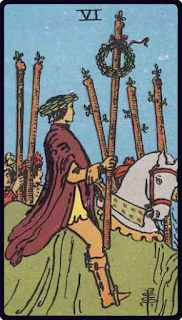
Representing transience and movement; the 6 of Wands moves beyond conflict to maintain forward momentum. Drawing our focus away from the efforts we have committed thus far our attention instead is drawn once more to our objective and the direction we seek. The 6 of Wands is an opportunity to return to the creative endeavour at hand and consider where we want to go next and what it is that we ultimately want to achieve. Forward momentum is the emphasis here no matter how significant that movement is whether it be a small step or a giant leap, the important element is the act of moving.
In the upright state the 6 of Wands asks us to consider the options at our disposal and measure their merit ultimately choosing one to pursue. The objective here is not to find a single action to achieve our goal but simply to move closer to that goal, the objective is to avoid stagnation and stasis.
In the inverted state the 6 of Wands represents indecision with regards to our next action, this could be the result of an abundance of choice, or the result of a lack of choice. In either scenario if no choice can be decided upon with logic and reason, then one must be chosen by chance alone. To remain in place without forward momentum is to achieve inaction which prevents creation. As a reminder, chance in a Spiritual context represents deference to a higher power, allowing that power to make the decision for us.
In the Rider-Waite deck the 6 of Wands is depicted as a rider upon his steed holding a wand in hand topped with the wreath of opportunity echoing the 4 of Wands representing a return to parity. In the background 5 more wands can be seen held by patrons out of sight these represent the momentum we have already achieved and the emphasis on maintaining forward motion lest that momentum be lost.
In self-reflection the 6 of Wands serves as a prompt to consider what is dynamic, moving, ever changing, and unpredictable in your environment; it’s important to recognise when you are creating works of art on the sand of a beach, when permanence is the objective, this serves as wasted effort, however when ephemerality is the objective, these efforts are not in vain.
Ask yourself “Will this hold up?” and “Do I need to account for that?” or “Can I safely ignore that?” whilst it can be tempting to plan ahead for every eventuality, it is ultimately a wasted effort to expend energy planning for extremely unlikely outcomes. There is a less than 1 in 1 million chance you will be struck by lightning but this isn’t an eventuality and is not a scenario that you plan for each time you leave the house. The 6 of Wands asks you not to create problems for yourself and to balance risk by focusing on the most likely outcomes instead.

No comments:
Post a Comment
All comments are moderated before they are published. If you want your comment to remain private please state that clearly.